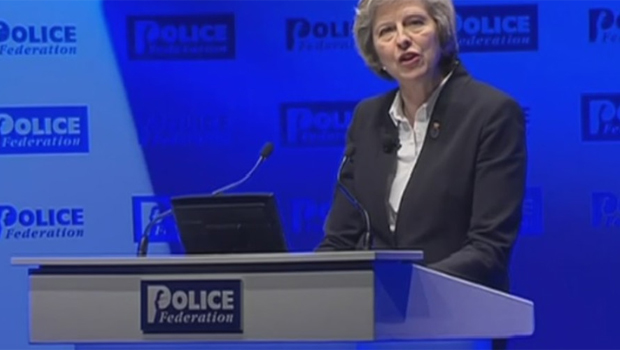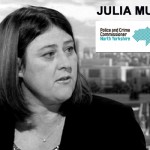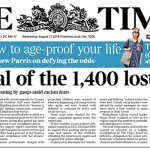The Prime Minister and the North Yorkshire Police
Unusually for Conservatives, Mrs May was very critical of the Police when she was Home Secretary. She addressed abuses that have been rampant in the police service for many years and have been overlooked by successive Home Secretaries, HMIC, the IPCC, Police Professional Standards Departments and Chief Constables.
Mrs May’s 2014 Speech to the Police Federation
Criticism of the police
In her speech to the Police Federation in 2014 (full text here: https://www.gov.uk/government/speeches/home-secretarys-police-federation-2014-speech) which she extensively criticized the police service and the Police Federation:
“In the last few years, we have seen the Leveson Inquiry. The appalling conclusions of the Hillsborough independent panel. The death of Ian Tomlinson and the sacking of PC Harwood. The ongoing inquiry by an independent panel into the murder of Daniel Morgan. The first sacking of a chief constable for gross misconduct in modern times. The investigation of more than ten senior officers for acts of alleged misconduct and corruption. (A reference, I believe, to North Yorkshire Police; please see below)
Allegations of rigged recorded crime statistics. The sacking of PCs Keith Wallis, James Glanville and Gillian Weatherley after “Plebgate”. Worrying reports by the inspectorate about stop and search and domestic violence. The Herne Review into the conduct of the Metropolitan Police Special Demonstration Squad. The Ellison Review into allegations of corruption during the investigation of the murder of Stephen Lawrence. Further allegations that the police sought to smear Stephen’s family. Soon, there will be another judge-led public inquiry into policing.
Reform of the Police Federation
Then there is the role of the Federation itself, which as Sir David Normington said in his review, needs to change from “top to bottom”. We’ve seen accusations of bullying, a lack of transparency in the accounts, questionable campaign tactics, infighting between branches, huge reserve funds worth millions of pounds, and a resounding call for change from your members – with 91% saying things cannot go on as they are.”
“The Normington Review found a lack of transparency and openness in the affairs and finances of the Federation. It found only limited accountability to the Fed’s membership and to the public. It concluded that the Fed was unable to promote good behaviour and professional standards. Police officers had lost confidence in the organisation and the Federation had lost its ability to influence and represent its members. As the report itself said, “we have encountered some [Fed leaders] who are more interested in fighting internal battles and protecting their own positions.”
The Normington Review made 36 recommendations and, as I said at the time, it is vital that the Federation implements every one of them. Because the best thing that can happen for policing in this country is for you – the representatives of every police man and woman in the land – to show the public that you understand the need for change. I want you to show the public that you get it, that you want to take responsibility, that you want to make sure the Federation operates in the spirit of public service.
But since the Normington Review concluded, that is not what has happened. Federation staff have been forced out and there have been allegations of bullying and victimisation. Instead of embracing the need for reform, some members of the Fed seems to have reverted to the worst kinds of behaviour exposed by the Normington Review.
I do not want to have to impose change on you, because I want you to show the public that you want to change. I want you to show them that you have the best interests of the police and of the public at heart. But make no mistake. If you do not make significant progress towards the implementation of the Normington reforms, if the Federation does not start to turn itself around, you must not be under the impression that the government will let things remain as they are.
The Federation was created by an Act of Parliament and it can be reformed by an Act of Parliament. If you do not change of your own accord, we will impose change on you”.
Report on the Normington Review here.
Mrs May then went on to address Police Federation finances, withdrawing Home office financing on the basis that it was unacceptable that the Police Federation had “vast reserves worth tens of millions of pounds, it is in receipt of public funds to pay for the salaries and expenses of the chairman, general secretary and treasurer” and announcing a change in the law so that officers will have to opt in to join the Federation. This will mean that officers no longer become Fed members by default, they now choose to join the federation voluntarily, instead of paying their subscription fees by default.
Mrs May subsequently reformed police disciplinary procedures, announcing amongst other things, that officers would no longer be allowed to resign or retire to escape disciplinary action, a register of dismissed police officers would be maintained to prevent them from being employed by another force, greater protection for police whistleblowers and reform of the police complaints system which lacks independence. There will also be a register of chief officers expenses.
In addition, police disciplinary hearings would be held in public. Report here: North Yorkshire Police publish disciplinary hearings outcomes. This has already had a big impact in North Yorkshire. Only because of the public hearing into the Case of Detective Constable Lane did the full extent of the disaster area that was the North Yorkshire Police Protecting Vulnerable Persons Squad become known. Thereby vindicating the concerns that the North Yorks Enquirer and Real Whitby have been raising for many years.
Prime Minister’s full speech on police reform here.
2016 speech to the Police Federation
Her 2016 speech to the Police Federation covered two issues that both the North Yorks Enquirer and Real Whitby have covered consistently over the last five years. These are:
A lack of openness, control and accountability in police finances.
“Then there are the Police Federation’s accounts. For the past 2 years, I have called these accounts in for review. What they have revealed is spending that has been both questionable and opaque. Branches spending tens of thousands of pounds on presents for retiring federation representatives – gifts that ordinary rank and file officers would never expect to receive. Other items – like £10,000 on an annual ‘plain clothing allowance’ in one branch – which defy explanation. The fact that some branches own what appear to be holiday homes, within an overall property portfolio worth £31 million.
Members’ subscriptions are not a slush fund for the fed or pocket money for its officials and I am sure ordinary members of the federation will be as concerned about how their money is being spent as I am. Just as they will be concerned by the arrest of 4 senior police federation representatives, including 3 serving police officers, for alleged fraud and potentially criminal misuse of federation funds.
That investigation has now passed to the Independent Police Complaints Commission (IPCC) and remains ongoing, so I will not comment on the details of the case. But I will say this. The allegations could not be more serious. They go to the heart of the self-serving culture identified by Normington.”
This very much mirrors the situation that exists in North Yorkshire Police, with abuses of taxpayers funding, lack of financial control, lack of openness and accountability:
- £500,000 was spent on providing Volvo V70 and Range Rover vehicles for senior police officers who were not qualified to drive these vehicles on police business.
- Approximately £28,000 was squandered on installing a personal private shower in the office of Chief Constable Della Canning.
- The wife of the former Police Superintendent in charge of NYPA police force training received £400,000 from North Yorkshire Police in payments to her training companies, which according to an audit report ‘often got work without going through proper procurement procedures’. The officer concerned escaped disciplinary action by submitting an application to retire after thirty years’ service.
- Assistant Chief Constable, David Collins who went off on the sick in November 2008, claiming stress, and was still off work in June 2009, on half his £100,000 per annum salary. An investigation by the North Yorkshire Police Authority discovered that at the same time he was promoting his life coaching consultancy service and offering mentoring services via the internet. When he discovered that the police authority wanted to take action against him he simply applied for retirement thereby ensuring that no action would be taken and he received a six-figure sum for his 30 years of service.
- Two counts of misconduct were upheld against Deputy Chief Constable Briggs and he retired from the force. After his retirement, it emerged that Deputy Chief Constable Briggs had received a tax-free allowance over several years of £31,647.06 which he could not account for, leading to further criticism by the IPCC.
- According to the IPCC Report a person identified only as “The Chief Constable’s PA” “authorised” a payment of £11,750 by North Yorkshire Police which Deputy Chief Constable Briggs should have paid himself.
- As a result of an investigation by myself, it emerged that Chief Constable Maxwell and Deputy Chief Constable Briggs had between them received £100,000 in tax free allowances which were not accounted for.
- The Independent Police Complaints Commission (IPCC) spent £100,000 investigating claims that Chief Constable Maxwell and Deputy Chief Constable Briggs, unfairly helped relatives during a recruitment exercise for new police officers.
- The full Police Authority costs for bringing the cases against Chief Constable Maxwell and Deputy Chief Constable Briggs was £218,456 spent on inquiries mainly on the investigation into the Chief Constable. If he had admitted his guilt at the beginning most of the costs could have been avoided.
- Although found guilty of “Gross Misconduct” Chief Constable Maxwell only received a written warning, although an act of gross misconduct is normally accepted as being so grave as to justify the summary dismissal of the employee. In my experience, in a commercial organisation, Chief Constable Maxwell and Deputy Chief Constable Briggs would both have been sacked and escorted off the premises. However Chief Constable Maxwell retired with a £250,000 payoff.
- Mr Jeremy Holderness Chief Executive of the then North Yorkshire Police Authority asserted that “Such allowances are not unfamiliar in policing, or indeed many other avenues of business, and they are seen to be quite reasonable in the circumstances of employment of senior professionals.” Although this was a lie. When I wrote to him and asked him to name any other organisation that made these tax free payments, predictably he did not respond.
- When I tried to carry out an inspection of accounts within the meaning of the Audit Commission Act 1998. Although the Audit Commission had confirmed that I was entitled to see the ledger entries and supporting receipts of the expense claims, and the Authorities own notice stated that I could attend and see copies of all related books, deeds, contracts, bills, vouchers and receipts, when I arrived at Newby Wiske Hall for this purpose, I was turned away, without access to any information.
No other force in the country has consistently had this level of financial scandals.
These failures are inexcusable and would never be tolerated in a commercial organisation. It is particularly concerning that throughout this period, North Yorkshire Police had a large finance staff and employed a qualified accountant Ms Joanna Carter as Treasurer and Chief Financial Officer and yet there appears to have been a failure of financial control. Ms Carter has since been promoted to Chief Executive of the Office of Police and Crime Commissioner of North Yorkshire at £103,414.50. per annum.
Criticism over the police response to domestic abuse and vulnerable victims
Mrs May went on to comment:
“I want to talk about one such issue in particular – the police response to domestic abuse and vulnerable victims more widely.
Because for years the violence, rape and emotional abuse that takes place every day behind closed doors was simply not being taken seriously enough, and all too often treated as a ‘second class’ crime. Claims neglected and ignored, suffering dismissed, blame and recrimination cast back at victims, rather than those responsible. In many cases, brutal violence was downplayed as ‘just a domestic’ and too little was being done to protect victims.”
The best definition of domestic abuse I can find is on the CPS website:
“Any incident or pattern of incidents of controlling coercive or threatening behaviour, violence or abuse between those aged 16 or over who are or have been intimate partners or family members, regardless of gender or sexuality.” This can encompass, but is not limited to, the following types of abuse:
- Psychological
- Physical
- Sexual
- Financial
- Emotional
Family members are defined as mother, father, son, daughter, brother, sister and grandparents whether directly related, in-laws or step-family. However, this is not an exhaustive list and may also be extended to uncles, aunts and cousins etc.”
Until recently some forces ignored domestic abuse against vulnerable adults (the aged and mentally ill) within families, this included crimes of violence, sexual abuse and financial abuse. However, it should be said that the British Police Service has generally made great advances on domestic violence.
North Yorkshire Police and Crime Commissioner Mulligan has made the protection of the vulnerable the top priority for NYP. So how are North Yorkshire Police doing there?
Domestic Violence
North Yorkshire Police has made steady progress in tackling domestic violence. In 2012 it introduce its Domestic Violence Disclosure Scheme and a recent article published by NYP asserted that 96% of domestic violence protection orders applied for were granted.
I have tracked down a FOI request which gives the figures for action taken over domestic violence and it is here. The impression given is of a force that has steadily improved its response to domestic violence, in line with the improvement in the police service nationally.
Sexual Abuse
In October 2014, Police and Crime Commissioner Mulligan ordered a health check on the NYP’s policies on preventing Child Sexual Exploitation (CSE). It was conducted by Detective Chief Superintendent Simon Mason and gave it a responding vote of confidence. PCC Mulligan’s triumphant press comment is here.
Exactly one month later the IPCC announced that it was conducting an investigation into failures by North Yorkshire Police to investigate child sexual abuse. The IPCC investigation found that an NYP intelligence officer in the Force Intelligence Bureau (FIB) failed to adequately deal with the intelligence. IPCC report here.
The Force Intelligence Bureau has long been a unit of North Yorkshire Police that the North Yorks Enquirer has been critical of, mainly because of its failings in the Peter Jaconelli and Jimmy Savile scandal. Initially it contended that Jimmy Savile had no connections to North Yorkshire although he lived in Scarborough. Then it claimed it had no intelligence on Savile or Jaconelli, which allowed Assistant Chief Constable Sue Cross to write a report exonerating North Yorkshire Police from any blame for its failure to arrest them.
It was only after the broadcast of a BBC investigation in which I participated that North Yorkshire Police admitted that many complaints about Savile and Jaconelli were made and unlawfully ignored. It subsequently transpired that North Yorkshire Police had known all about Jaconelli since at least 1972, when he was charged with sexual assault. Again, such was the incompetence of the NYP investigation into Jaconelli, that it was the NYE investigation that discovered this, not the police.
Following the decision to bring misconduct charges against Detective Constable Lane in November 2016, it emerged that in July 2014 following the collapse of a rape trial because of incompetence by North Yorkshire Police, a judge castigated the force in open court. This was a few months before Detective Chief Superintendent Mason had issued his glowing report on standards in the Protecting Vulnerable Persons Unit. Full report here: The strange case of Detective Constable Lane.
Then North Yorkshire Police was criticised following a failed investigation into child abuse at Ampleforth School in August 2016.
This article describes North Yorkshire Police’s latest initiative to provide support to victims of domestic abuse. This article describes the implementation of a new unit in North Yorkshire Police to investigate non recent sexual abuse, following the Peter Jaconelli scandal. Whilst this is again commendable, North Yorkshire Police are still refusing to investigate allegations of police corruption in its failure to arrest Peter Jaconelli or Jimmy Savile.
It therefore appears to me that despite the window dressing and fine sounding press releases, nothing has changed. The bungled investigation into allegations of abuse at Ampleforth by the Protecting Vulnerable Persons Unit is particularly concerning and indicates a lack of expertise and of detectives that are specialised and experienced in this type of complex and sensitive investigation. It may also indicate a failure of senior leadership and a lack of supervision over investigations. This is deeply concerning, because it appears the specialist squad responsible for implementing NYP’s highest policing priority –protection of vulnerable people- is dysfunctional.
Financial abuse
As someone that is responsible for the care of a vulnerable adult and this subject has been of close interest to me for some time. Financial abuse of the aged has become a more prevalent offence, because as a result of the move in the 1980’s under the Thatcher Government to improve home ownership and the steady rise in house prices, many elderly people who are infirm and therefore vulnerable, own houses that are highly valuable. Consequently, offences of fraud by members of the family in trying to evict elderly relatives from their homes and then sell them are now becoming a prevalent offence. This is shown in this article, which covers the subject extremely well: Elderly being robbed of millions each year by their own families
The case quoted in the article of a woman who sold her house to her grandson on the understanding that she could stay there for life, but was then made homeless while he sold the house, is a classic property fraud committed by a close relative.
In another example of financial abuse of an elderly person, Detective Constable Shane Martin and Financial Investigator Katherine Wells of North Yorkshire Police Fraud and Economic Crime Unit recently conducted a most successful operation against three carers
The Fraud Act 2006 defines these crimes as a new offence of “Fraud by Abuse of Position”. However unfortunately many police forces and Social Services Departments ignore this and continue to ignore fraud and emotional abuse committed against the elderly by relatives. Hence the statement from the minister for policing, crime, criminal justice and victims, Mike Penning, who has stated Home Office policy as “Criminal acts are illegal, whether they are committed by a family member or a stranger.”
Hopefully this will have some impact and the old ways of abandoning victims by categorising offences of fraud and abuse by family members as an internal family matter thereby evading any police responsibility to take action and abandoning the victim to his fate will be rejected.
Emotional and psychological abuse
It is difficult to assess the performance of North Yorkshire Police on these types of abuse. I have never seen any reference to emotional or psychological abuse in any information release issued by North Yorkshire Police, or any case of action taken against a perpetrator of emotional abuse. Although NYP did issue this notice encouraging victims of abuse to come forward: https://northyorkshire.police.uk/news/police-urge-victims-domestic-abuse-dont-suffer-silence/.
North Yorkshire Police and reform
Despite the Prime Minister’s criticism of profligacy in police funding, Chief Police Officers continue to siphon off police funds/resources for their own personal benefit, apparently with impunity. Whilst no effective action was taken against Metropolitan Police Deputy Assistant Commissioner Maxine de Brenner, it should be said that at least her case was publicised and she retired, rather than try to defend herself at a public misconduct hearing.
The conduct of officers of North Yorkshire Police is I believe one of the factors that determined the Prime Minister to issue her public criticisms of the police service. Certainly no other force I am aware of had the number and level of financial scandals that North Yorkshire Police suffered from, some of which were revealed by Real Whitby and the North Yorks Enquirer.
As the Prime Minister confirmed, there has been a long running issue with a failure of oversight and accountability over the police. This is certainly the case in North Yorkshire. The retraction of the Cross report, the refusal to acknowledge or investigate collusion by officers of North Yorkshire Police and its predecessor force in the protection of Jimmy Savile and Peter Jaconelli from arrest. No action was taken against Saville an Jaconelli despite forty years of offending being regularly reported to the police, no police officer has ever been disciplined for this misconduct.
Happily, citizen journalists from Real Whitby were at least able to eventually force North Yorkshire Police to admit to its failures in the Jaconelli scandal, after two years of determined denial. This again shows the importance of a free press holding the police to account. It also shows the power and influence of citizen journalism in the internet age.
In summary, North Yorkshire Police leads the UK in siphoning off police funds into the back pockets of senior officers and arguably has one of the worst records in protecting children. The PVP unit is apparently not able to successfully investigate historic or complex sexual offences cases and based on the recent string of major investigative failures (the ones we know about) is arguably one of the worst in the British Police Service at the present time.
Even now, Police and Crime Commissioner Julia Mulligan is still ignoring and stonewalling requests for an investigation by an outside force into the role of Scarborough Police in the Jaconelli/Savile scandal. Indicating an organisation that is unable to acknowledge or admit any failings, is under inadequate oversight and is successfully resisting change, with the complete acquiescence of the Police and Crime Commissioner.

[Prime Minister Theresa May as Home Secretary where she did so much to reform the police, pictured here with North Yorkshire Police and Crime Commissioner Julia Mulligan, who has proven to be completely ineffective in addressing the Prime Minister’s key policing concerns.]
The media and reform of the police complaints system
The Prime Minister’s reforms are a major step forward, but there is still a long way to go. Police and Crime Commissioner Mulligan has herself described the Police Complaints System as Not fit for purpose with the odds stacked against the complainant. In my view PCC Mulligan’s assessment is accurate.
The failure of the IPCC, the former Police Authorities, and Police and Crime Commissioners like Julia Mulligan to exercise control over police forces and to hold them to account, has led to the emergence of specialist websites that exercise scrutiny over police forces. In the United States many forces have a Copwatch site and this is spreading to Canada and Europe. This one copwatchnyc.org covers New York Police Department (NYPD). I believe that in the future, unless the system of oversight of the police in the UK is fundamentally overhauled to make it effective and credible, every police force in the UK will eventually have a website that scrutinises individual police forces and holds them to account. Greater Manchester and West Yorkshire Police already have similar websites of this type. I am unaware of any other forces with websites of a similar nature, but I am sure they will come.
This will represent another challenge for media policy in the British police service. ACPO policy is to treat Citizen Journalists the same as the mainstream traditional media. Some forces I have worked with like Gwent, Sussex, Wiltshire and the Metropolitan Police have embraced this policy and work well with Citizen Journalists. Their investigations have been assisted as a result. Others do not. In my opinion, North Yorkshire is one of the forces that does not. As an example, currently, Police and Crime Commissioner Mulligan is refusing to respond to my correspondence, requesting her to confirm what North Yorkshire Police policy is on Citizen Journalists. The implication of this is that either:
- North Yorkshire Police has not accepted the ACPO recommendations and there is no force policy on co-operation with Citizen Journalists and does not want to admit this.
- There is a force policy on co-operation with Citizen Journalists, but North Yorkshire Police will not confirm to the public what it is, because it prefers not to operate openly.
- North Yorkshire Police does have a policy towards Citizen Journalists, i.e. “Shoot on sight”, but does not want it to become known to the public, in case revealing it could be damaging to the image and reputation of the force.

[STOP! North Yorkshire Police force policy prohibits you from shooting him Constable. He’s not a journalist.]
North Yorkshire Police and the office of the North Yorkshire Police and Crime Commissioner were given access to the initial draft of this article and given the opportunity to comment, but chose not to.
Complaints
If you disagree with anything written in this article, the NYE team will then consider the complaint fairly and objectively and, where necessary, consider publishing a correction, apology, retraction or deletion, as appropriate. You can submit a complaint or correction to the NYE Letters e mail address letters@nyenquirer.uk



























Comments are closed.